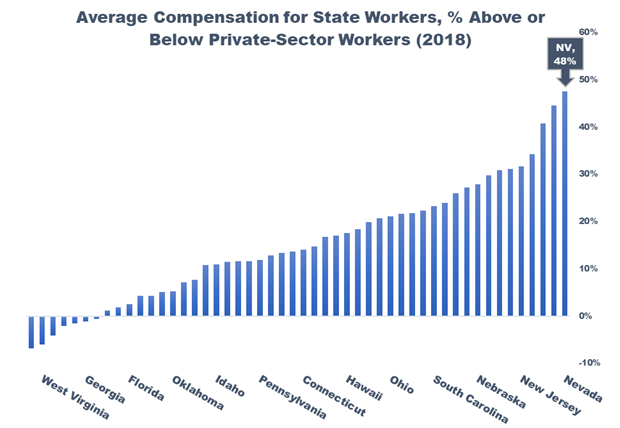
Lawmakers cut millions from education and healthcare to appease politically connected unions
Nevada lawmakers have put the concerns of politically connected government unions over those of taxpayers, students and at-risk Nevadans.
Rather than restoring funding to education and healthcare services, the Legislature instead chose to put roughly $40 million back into the pockets of state government workers by reducing the number of furlough days and pay freezes initially proposed by Governor Sisolak.
The Legislature’s preferential treatment of state workers, at the expense of other public services such as education and health care, cannot be explained on legitimate public policy grounds given state workers already enjoy disproportionately high compensation levels.
In 2018, the average state worker in Nevada received $87,925 in total compensation, according to newly released data from the Bureau of Labor Statistics.
That amount was higher than what the average state worker in 42 other states received, and 4th highest after adjusting for the different price levels between the 50 states.
It was also 48 percent more than the $59,584 received by the average private-sector Nevada worker, a disparity which was the largest nationwide:
The new data serves as an update to a Nevada Policy study released last year, which also found that Nevada state workers earn significantly more than both private-sector Nevadans as well as their government peers in most other states.
The data make clear that Governor Sisolak’s initial proposal of a merit pay freeze and a single monthly furlough day was already incredibly generous and favorable to state employees, almost all of whom will avoid the mass unemployment facing most Nevadans.
The Legislature’s decision to spend precious resources on enriching state workers — while simultaneously slashing funding for education, healthcare and other services — makes clear that lawmakers have prioritized the concerns of newly-unionized state employees over those of everyday Nevadans.
It also demonstrates how organized labor’s outsized political influence has corrupted the democratic process at the expense of ordinary Nevadans who are struggling to endure the worst economic crisis of their lives.
For a more comprehensive assessment of compensation levels for state workers, readers should consult the NPRI study, The political push for state-worker collective bargaining.
